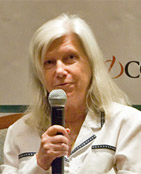 Near the end of 2008, Unitus had the unique opportunity to sit down with one of the most promising leaders in microfinance today, Ingrid Munro, founder and director of Unitus partner Jamii Bora Trust. The interview was published in the November/December 2008 issue of Microfinance Insights, the industry’s leading trade publication. In an intimate conversation, we were able to ask some of our most pressing questions about her background, the potential for growth in microfinance in Africa, and why external evaluations of a borrower’s poverty level are not her top priority.
Near the end of 2008, Unitus had the unique opportunity to sit down with one of the most promising leaders in microfinance today, Ingrid Munro, founder and director of Unitus partner Jamii Bora Trust. The interview was published in the November/December 2008 issue of Microfinance Insights, the industry’s leading trade publication. In an intimate conversation, we were able to ask some of our most pressing questions about her background, the potential for growth in microfinance in Africa, and why external evaluations of a borrower’s poverty level are not her top priority.
Following is an excerpt of our conversation with Ingrid:
Unitus: You are the Swedish daughter of a Christian missionary who worked in Africa for many years. What brought you to Kenya to work in housing and how did you transition from the housing sector to microfinance? Where did your inspiration come from?
Ms. Munro: My dad was a missionary and medical doctor in Rhodesia [now Zimbabwe] and he brought my brothers and sisters up to have enormous respect for Africa and African culture. That is how I came to work in Africa. It’s true that my background is in housing. In the late 1980s, I was the head of the African Housing Fund. It was my job to convince governments, donors, and non-governmental organizations (NGOs) about the importance of housing for the poor. At that time, we spent a lot of time looking at practical solutions and best practices that could help people improve the housing situation. That is when we began to look at financial solutions and Grameen Bank. This was also around the same time that Dr. Muhammad Yunus was looking into housing. We saw this as a practical way for the poor to access housing. I continued to see microfinance as a practical way for people to break the cycle of poverty. In 1988, the Ford Foundation funded Dr. Yunus to come to Africa and I met him. He gave me a lot of good advice and I saw how microfinance could go beyond just housing. That is when I saw a much bigger opportunity, beyond just housing, to help reduce poverty.
Unitus: I’ve heard people call you “revolutionary.” What about your philosophy is different from what everyone else in microfinance is doing?
Ms. Munro: I think that description comes from the fact that many people say that the destitute cannot be reached with microfinance, and yet we are doing just that. Because our staff members all begin as members of Jamii Bora, they know firsthand about the challenges of poverty. Therefore, our staff and our members have a unique bond that is very strong and promotes an environment of working together to make sure Jamii Bora is relevant to them. Together, staff and members create innovations that work for them. We are for the poor, by the poor. We adapt to what is natural for our members; innovations come from them all the time. We are a movement of people, and it is our drive to get out of poverty that gives us strength.
Unitus: Since Dr. Muhammad Yunus received the Nobel Prize, there has been a swing in perception about microfinance; the public has at times thought of it as a panacea for poverty, while others have said that microfinance can do little to change economies and lift the poor out of poverty. What do you think about microfinance as a tool to alleviate poverty?
Ms. Munro: To get out of the vicious cycle of poverty, people do need more than just access to finance. They also need insurance, education, healthcare, housing—all the things that can help them move up and out of this vicious cycle instead of spiraling downward. Microfinance needs to be combined with other programs to help people get out of poverty. It must also be stressed that microfinance should be about creating jobs. Many people think that microfinance is a way for one person to get a loan. Successful microfinance is when one loan leads to a business that then creates a job for themselves and others. One of the criticisms is that not everyone is an entrepreneur. I say that’s okay because entrepreneurs and non-entrepreneurs need one another, and together they can help more than just themselves.
Unitus: What do you think about the mixing of microfinance and capital markets? What is your stance on the growing interest from large-scale investors in making money from microfinance?
Ms. Munro: Our mission is not to be profitable. Our mission is to assist our members to get out of poverty. But to be sustainable, we must cover our costs. If we relied on subsidies to cover our costs, we would go nowhere. In general, the members that are further along subsidize the members that are just starting out. So we are sustainable in that sense; we cover our costs and make a little plus so we can keep investing in the organization such as new technology, which of course helps us to reduce costs even more. Microfinance organizations are social organizations and they must stay true to that. To reach more people, grow the organization, cover costs, and be sustainable, you must subsidize new members with successful members. That is the model.